Table of Contents
Backend frameworks serve as the backbone for building robust and scalable web applications, managing server-side tasks, and overseeing databases. The right choice in the backend frameworks not only boosts development efficiency but also significantly improves the performance of your web applications.
In recent years, businesses have navigated a labyrinth of challenges and witnessed profound transformations. This trend is set to continue into 2024, as new developments emerge frequently. Companies are now grappling with the repercussions of a global pandemic.
According to a study by McKinsey & Company, we are on the brink of a once-in-a-generation surge in capital expenditure on physical assets, expected to reach approximately $130 trillion by 2027. This investment will primarily focus on decarbonization and the renewal of critical infrastructure.
In these dynamic times, you might wonder what the most critical element is to keep your business ahead of the curve. While factors like accelerated digital transformation, inflation, supply chain security, sustainability, and immersive customer experiences are vital, the fundamental driver for business excellence and staying competitive lies in leveraging advanced digital tools and technologies. Here, backend frameworks play a pivotal role.
What are Backend Frameworks?
If terms like Java, PHP, and Ruby on Rails sound familiar, you’re already acquainted with some of the top back-end technologies that form the backbone of websites and web apps.
Backend frameworks provide a structured environment that simplifies and accelerates the web development process. It comprises a set of tools and models that assist developers in constructing the architecture for websites, web applications, mobile apps, or software. It’s easy to confuse the back end with the front end, but they serve distinctly different purposes. To understand this better, you might find our article “Frontend vs Backend” enlightening.
Most Popular Backend Frameworks for 2024
1. ASP.NET Core
ASP.NET Core stands out as an open-source, cross-platform backend frameworks which are designed for building applications using the comprehensive .NET ecosystem. This framework, a streamlined version of Microsoft’s server stack, enables the development and operation of applications across various platforms and environments. It supports a range of programming languages such as C#, F#, Visual Basic, NodeJS, and JavaScript, making it versatile for creating web apps and API servers.
Benefits of ASP.NET Core
- Integrated with JavaScript: ASP.NET Core leverages JavaScript, one of the most widely used programming languages, to enhance backend functionality.
- Efficiency with Minimal Coding: The framework’s design allows for significant coding reductions, streamlining the development process.
- Enhanced Performance: Known for its substantial performance improvements, ASP.NET Core is considered one of the top backend frameworks for efficient development.
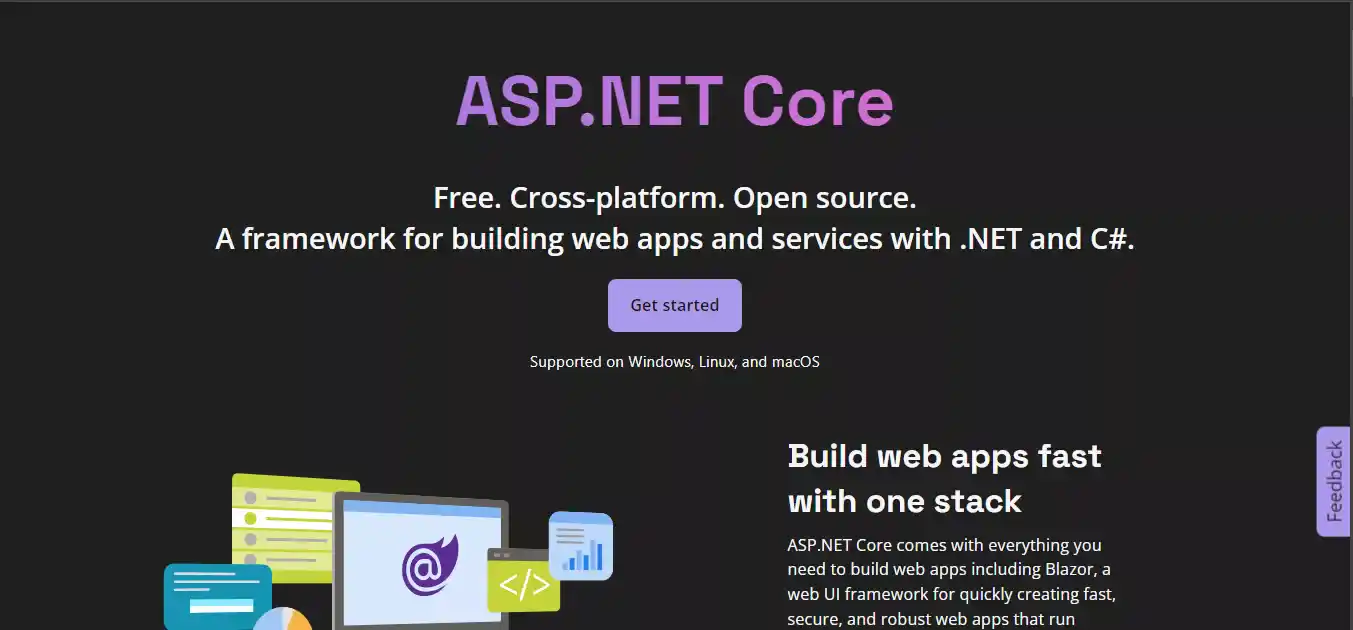
- Optimal for Windows Platforms: For developers targeting mobile or web applications for Windows users, ASP.NET Core offers an ideal backend solution due to its robust architecture and compatibility.
2. Django
Django is a robust, open-source web backend frameworks developed in Python, adhering to the model-view-controller (MVC) architectural pattern. It’s particularly geared towards constructing complex, database-driven websites. If high performance is your top requirement, Django is the ideal choice.
Benefits of Django:
- Scalability: Django’s code reusability allows developers to efficiently manage increasing website traffic.
- SEO-Friendly: Optimizing websites for search engines is straightforward with Django. Its popularity ensures a supportive community for users.
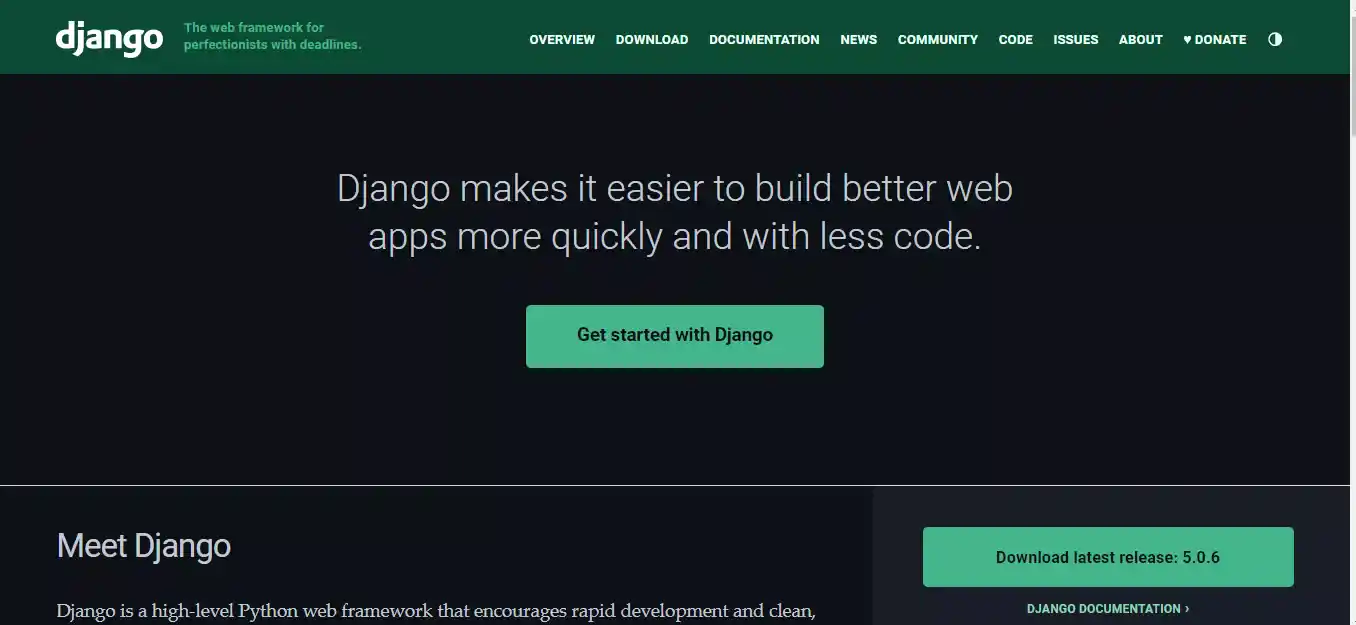
- Low-Code Features: While Django is not exclusively a no-code platform, it offers low-code options through numerous packages that minimize the need for extensive coding.
- Enhanced Security: Django provides built-in security features such as SQL injection protection, XSS defense, password hashing, and more, protecting your web applications from hacker attacks.
3. Laravel
PHP powers 76.8% of websites with its server-side capabilities. Thanks to its quick turnaround and robust security features, PHP and its frameworks are the top picks for many web developers.
Among the PHP frameworks, Laravel stands out as a superior choice for developers focused on backend development. This open-source framework is tailor-made for crafting sophisticated symphony-based web applications.
Key Benefits of Laravel:
- Enhanced Security: Laravel secures web applications with advanced algorithms for strong password creation, helping to fortify them against threats.
- Rich Ecosystem: Beyond PHP, Laravel supports various web technologies including CSS and JavaScript, enriching the development experience.
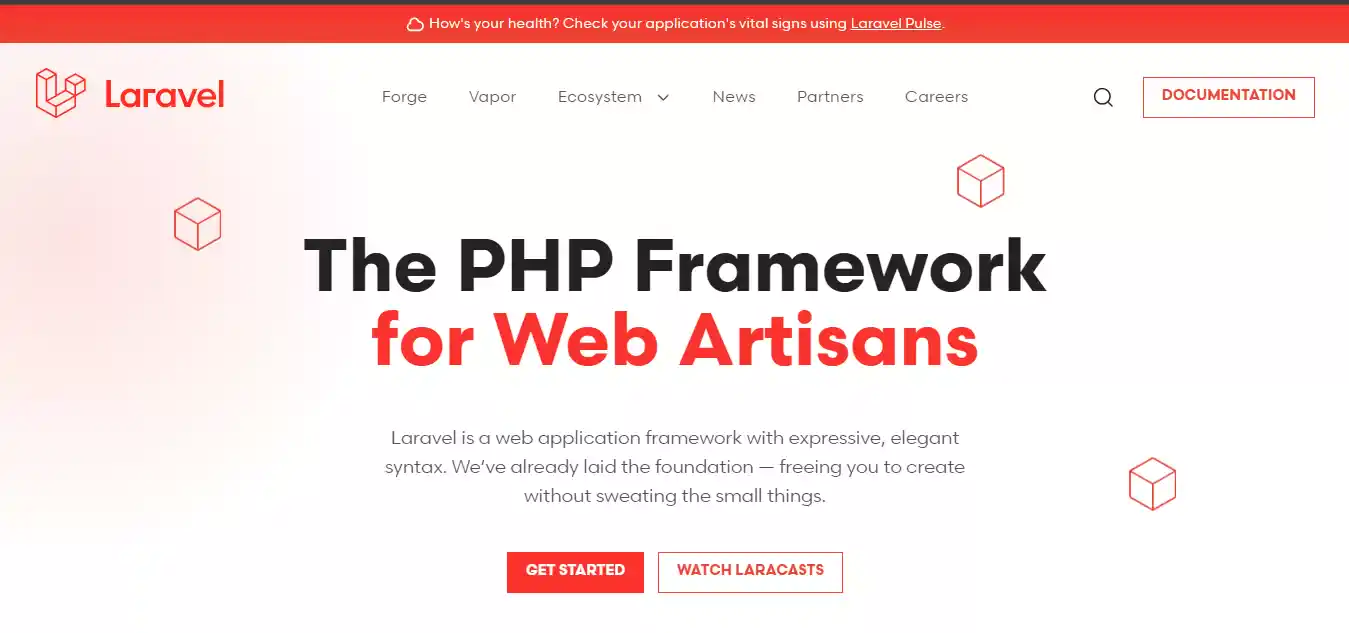
- Efficiency in Complex Projects: Laravel shines when handling complex web projects due to its comprehensive tools and libraries.
- Seamless Mail Integration: Features a straightforward API that works effortlessly with the SwiftMailer library, simplifying email communications within applications.
If Laravel’s capabilities have caught your interest, and you’re considering hiring a Laravel development company for your project, check out our tips on choosing a Laravel development partner.
While Laravel is excellent for complex projects, it might be overly sophisticated for simpler applications, making it more suitable for experienced developers rather than beginners.
4. Ruby on Rails
Ruby on Rails stands out for its full-stack capabilities and user-friendliness. This backend frameworks simplifies web application development by automating many complex tasks, allowing developers to focus on the core application code. Despite Ruby’s niche position in programming language popularity, Ruby on Rails remains a favored choice due to its supportive features like automated testing and extensive libraries.
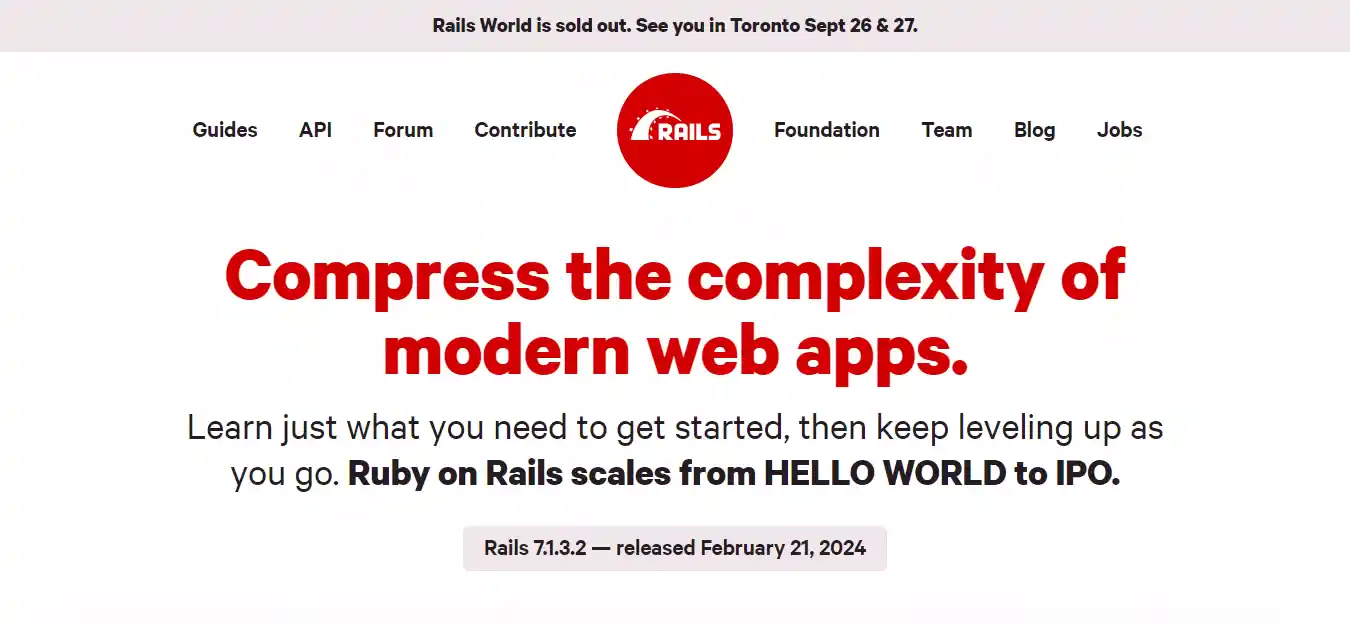
Benefits of Ruby on Rails:
- Enables real-time updates and data synchronization.
- Offers exceptional adaptability and flexibility, granting developers complete control over project management and database functionality.
- Ideally suited for beginners due to its straightforward and intuitive nature.
This version enhances clarity and coherence, focusing on the strengths and benefits of Ruby on Rails.
5. Express.js
Express.js, often simply called Express, is a Node.js backend frameworks which are widely used for building APIs and web applications. It is a crucial component of the MEAN stack, partnering with AngularJS for front-end development and NoSQL databases for data management. Recognized as a premier choice for online application development, Express.js stands out in the tech community.
Benefits of Express.js
- Express.js is celebrated for its simplicity and efficiency. As a JavaScript framework operating within the Node.js runtime, it allows developers to seamlessly transition between frontend and backend development.
- This unified approach to web development not only streamlines the development process but also reduces costs by eliminating the need for separate frontend and backend teams.
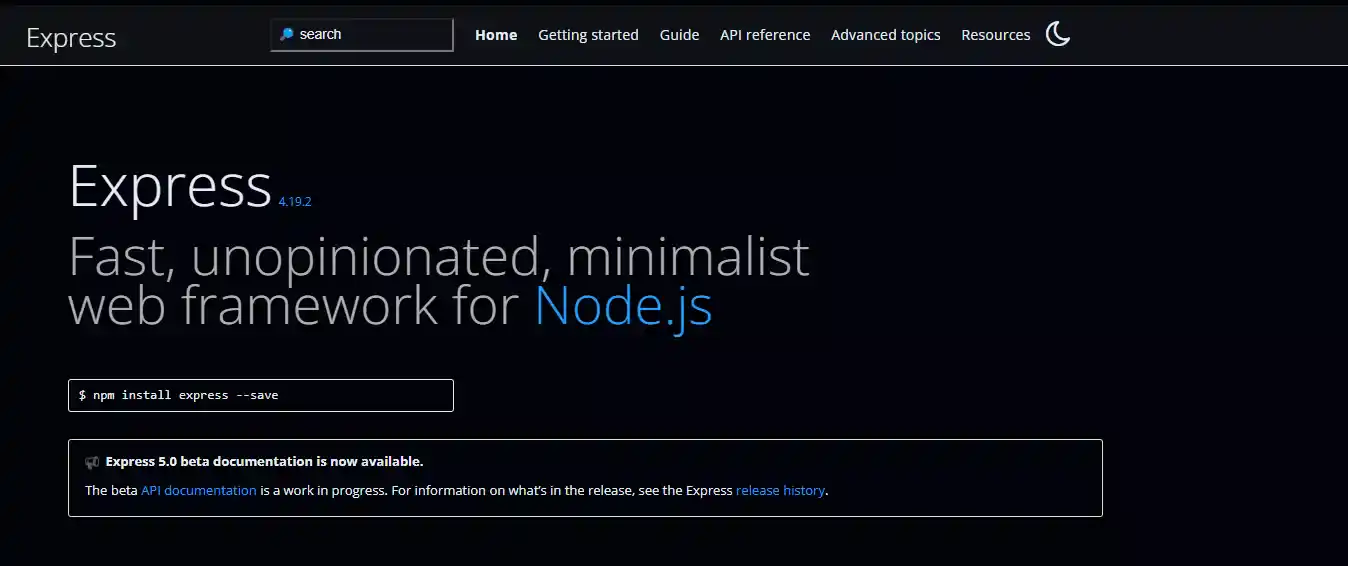
- Furthermore, Express.js is renowned for its high performance, making it a top choice for developers prioritizing speed and efficiency in their applications.
- For developers well-versed in JavaScript but less comfortable with other programming languages, Express.js offers a familiar and powerful environment to excel in full-stack development.
6. CakePHP
CakePHP simplifies custom web development by offering a versatile scaffold to jumpstart the creation of web applications. This pre-constructed code serves as an effective foundation, adhering to the MVC (Model-View-Controller) architecture. CakePHP is open-source, licensed under the MIT License, making it widely accessible for developers.
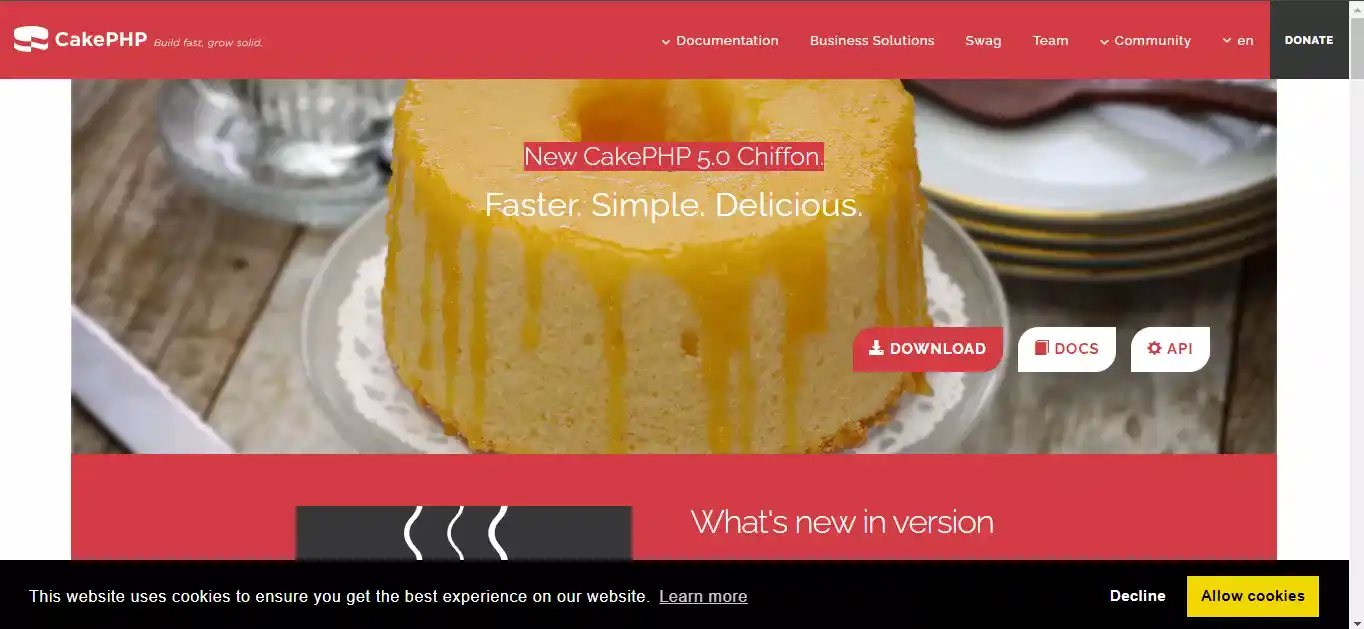
Advantages of CakePHP:
- Scalable: Easily handles growing user demands and increasing data loads, making it ideal for projects of any size.
- Versatility: Suitable for projects ranging from simple beginner-level to advanced complexity.
- Secure Architecture: For developers with experience in PHP, CakePHP offers a robust and secure framework that supports the development of dependable web applications at any complexity level.
7. Flask
Flask is a WSGI web framework that operates the web server instead of the user’s browser. Many modern applications choose Flask because it allows for the creation of customized projects with seamless operation. It supports various extensions that integrate so smoothly they seem like native features of Flask.
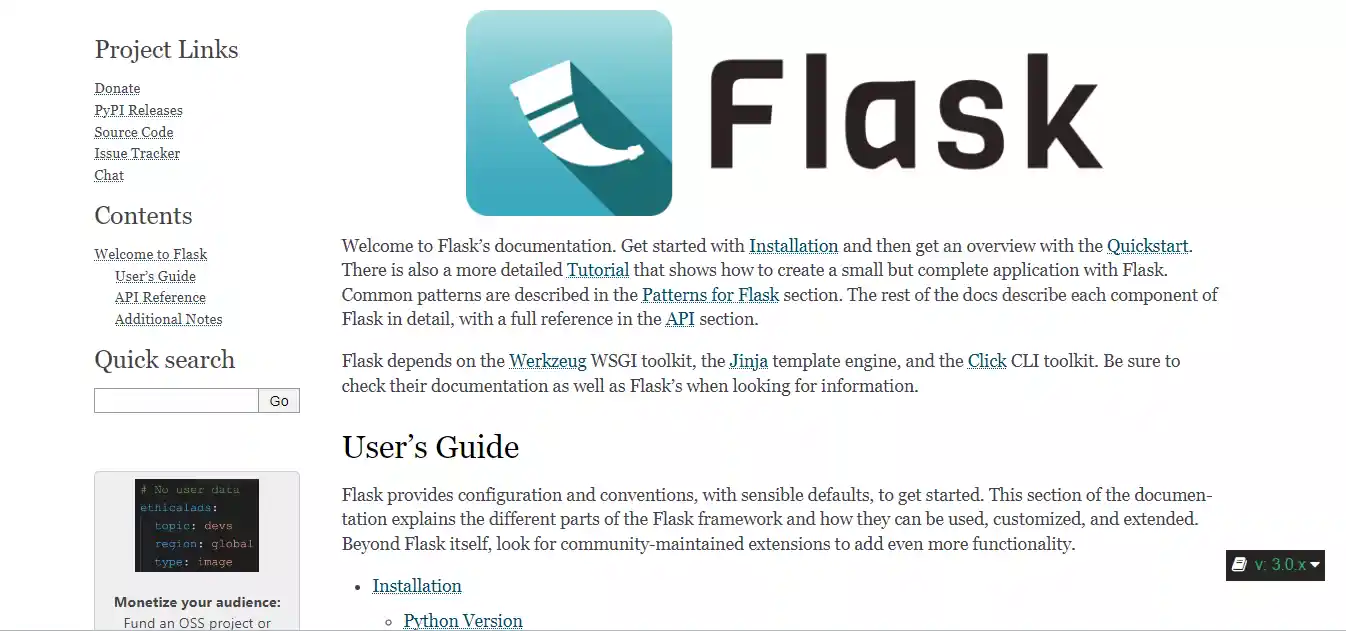
Benefits of Flask
- Flask comes with a built-in development server which simplifies debugging and allows developers to run Python code directly in the browser during error handling.
- It streamlines the setup of web servers.
- Flask’s simplicity encourages the rapid development of Python applications, leveraging Python’s efficiency in requiring fewer lines of code compared to other programming languages.
- Developers familiar with Python will find Flask easy to use, making it an excellent choice for focusing on server-side web development.
Related Article
Backend Framework Showdown: Exploring the Leading Choices for Web App Development
Conclusion
In the ever-evolving technological landscape, backend frameworks stand as crucial elements, ensuring robust, scalable, and secure web applications. As we face technological shifts and economic challenges, the importance of selecting the right backend framework becomes increasingly clear. Each backend frameworks, from Flask to Express.js, offers unique benefits tailored to different development needs. These technologies not only enhance competitive edges in a digital-first world but also pave the way for future innovations in digital interactions and infrastructure. Embracing these frameworks allows developers and businesses to adapt and thrive in a dynamic environment, making it essential to harness their potential to drive forward-looking digital solutions.